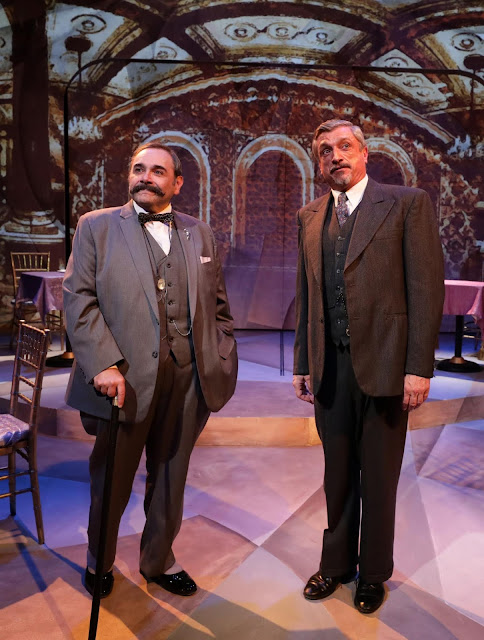 |
| Phil Tayler & Anna Bortnick in "Parade" (photo: Sharman Altshuler) |
 |
| The Cast of "Parade" (photo: Sharman Altshuler) |
The musical's story begins as a Confederate soldier goes off to fight the Civil War, and segues to 1913 when the disabled veteran readies himself to march in the annual Confederate Memorial Day parade held dear by Southerners who refused to commemorate their loss in the war. The (true) story takes place at the trial of a Brooklyn-born Jewish factory manager in Atlanta, Leo Frank (Phil Tayler, reason enough to see any show), accused of raping and murdering his thirteen-year-old employee Mary (Anna Bortnick), daughter of Mrs. Phagan (Anne Sablich). She had previously flirted with Frankie Epps (Gable Kinsman), who falsely testified that she complained to him about the looks Frank would give her. Thanks to this lie (corroborated by a trio of young girls who knew her, played by Lilli Jacobs, Katie Elinoff and Angela Syrett) and a rabid press, including right-wing journalist Tom Watson (Todd Yard) and ambitious novice newsman Britt Craig (Dan Prior), as well as politician Hugh Dorsey (Jerry Bisantz) who resolves to solve the case, and an equally rabid crowd.
 |
| Aaron Patterson & The Cast of "Parade" (photo: Sharman Altshuler) |
With testimony from worker Jim Conley (Aaron Patterson), Frank was convicted and sentenced to death by Judge Roan (Brad Peloquin). When this death sentence was commuted, a mob emerged to attempt to take justice into their own hands. One eerie note: librettist Uhry's great-uncle in real life owned the factory managed by Frank. Also featured in the cast of characters as witnesses are Minnie McKnight (Yewande Odetoyinbo) and Newt Lee (Elbert Joseph), as well as Luther Rossner (Andrew Child). Everyone in this production, beginning with Tayler and his wife Lucille's (Haley K. Clay) slowly percolating roles and extending to some show-stealing turns by Prior and Patterson, was stellar.
 |
| Dan Prior & Gable Kinsman in "Parade" (photo: Sharman Altshuler) |
The later 1915 parade passes by as the ensemble reprises “The Old Red Hills of Home” and the score ends with this as well. There are more than two dozen songs in all, making this work virtually operatic, with standouts such as “Pretty Music”, “Do It Alone”, Leo's poignant “It's Hard to Speak My Heart”, Conley's jaunty “That's What He Said”, the jury's chilling cakewalk “Closing Statement and Verdict” and “All the Wasted Time”, Frank and Lucille's near-finale duet; this song expressly deals with how both have grown through their impending tragedy and their captivating relationship, after Lucille castigated him for his intention to work on a holiday. Their feelings morph from cold to warm as Lucille begins to fight for her husband's freedom and his life. Throughout the play, Brown displays obvious homages to the Great American Songbook, from Sousa to Sondheim, a mesmerizing score sung by a meticulously elegant cast.
 |
| Phil Tayler & Haley K. Clay in "Parade" (photo: Sharman Altshuler) |
Wonderfully
Directed by Jason Modica, the production boasts almost non-stop,
exquisite Choreography by Kira Troilo, impeccable Music Direction by
Catherine Stornetta, fabulously imagined Set Design by Lindsay
Genevieve Fuori, terrific Costume Design by Chelsea Kerl, essential
Lighting Design by Steve Shack and ominous Sound Design by Elizabeth
Cahill. On the performance and creative levels, there's not a nit to
pick. This is as close to perfection as regional theater (or any
theater) gets, fundamentally due to Modica and Tayler, whose
dedication to the work goes back a decade to their Boston
Conservatory efforts. It may be a less hopeful entity these days, but
remains a haunting work, and an obvious labor of love.
It
should be noted that both the revival of the KKK (Klu Klux Klan) and
the rise of the ADL (Anti-Defamation League) resulted from this
historical event. 'Nuff said.
Before
this Parade passes by, be sure to take it in, through December
28th.

































